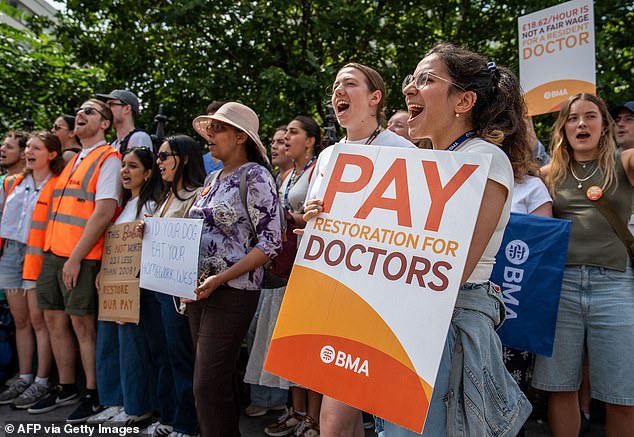[ad_1]
Medics working through the doctors’ strike say that patients are ‘guaranteed’ to suffer cancelled appointments and treatment delays—despite promises of business as usual from health chiefs.
In pursuit of salary hikes worth up to £20,000, resident doctors began their walk out today with patients set to experience ‘untold misery’, according to the Health Secretary Wes Streeting.
The strike could cause 250,000 NHS appointments to be axed or postponed and may cost the NHS £87million in staffing cover, according to think tank the Policy Exchange.
Now doctors admit that they are already seeing the impact of their militant colleagues’ picket action.
Mr Anil Joshi, an ear nose and throat surgeon said: ‘It is certainly not business as usual. Staff that are here are being spread thin and there have been cancelled operations and this is likely to be worse at the start of next week.
‘It is often the complex surgeries that people have been waiting months for that are cancelled as they require a team of people, so this would be surgeries like knee and hip replacements, or in my department, reconstructive operations.’
The surgeon said that the strikes are also leaving him with difficult decisions to make for urgent operations.
‘This afternoon I am doing an operation for a cancer patient that would normally require a team of three people, but I am doing it myself,’ says Mr Joshi.

The strike could cause 250,000 NHS appointments to be axed or postponed and may cost the NHS £87million in staffing cover, according to think tank the Policy Exchange

Up to 50,000 resident doctors – formerly known as junior doctors – began strike action today in pursuit of a further 29 per cent pay rise.
‘These are urgent cases, so I can not cancel. I am just having to push myself to make sure that the patients are seen.’
Speaking to the MailOnline other senior doctors have hit out at resident doctors for striking.
‘I think the mood is that everyone was supportive before but there is no support from senior doctors now, if anything they are now rolling their eyes,’ says a leading cardiologist.
‘So far there have been minor cancellations, but it is putting a lot of extra strain on the doctors that are working.’
Up to 50,000 resident doctors – formerly known as junior doctors – began strike action today in pursuit of a further 29 per cent pay rise.
The five day walk out began after the BMA’s resident doctors committee pulled the plug on negotiations on Tuesday and announced it would plough on with the strike.
On the eve of the strikes, Wes Streeting told the Mail he would not cave in to their ‘unreasonable’ demands, adding: ‘I’m not going to let the BMA hold this country to ransom.’
Mr Streeting has refused to budge on pay but has offered a number of other financial concessions relating to the cost of exams, equipment and training.
The Health Secretary described it as ‘unprecedented’ for a union to lead its members to the picket line after receiving inflation-busting pay rises totalling 28.9 per cent over three years.
Mr Streeting said the BMA owes an ‘apology’ to patients who are left in pain and agony for longer as a result of appointments being cancelled and said they seem to have ‘lost sight’ of their responsibility to ‘Do No Harm’.

Mr Streeting had refused to budge on pay but offered a number of other financial concessions relating to the cost of exams, equipment and training
NHS England said hospitals and local teams have been preparing before the strike and have plans in place to ‘minimise disruption to patient care and ensure life-saving care continues.’
The last round of strikes by resident doctors 60,000 appointments were rescheduled across the country.
Doctors have warned that this will further add to the backlog of planned procedures.
Dr Chris Streather, medical director for NHS London, hospitals had ‘quite a lot of practice’ with managing care during industrial action.
‘We will do as much as we can,’ he said. ‘But some things will get cancelled inevitably.’
He added: ‘The more worrying thing this time around is the cumulative effect of repeated cancellations of planned care.
‘Since 2022 when this all started, we’ve cancelled nearly 1.5m planned appointments, and every time this happens, we lose about another 60,000.
‘Although we make emergency care safe, we can’t really deal with that backlog in planned care.’
[ad_2]
This article was originally published by a www.dailymail.co.uk . Read the Original article here. .

